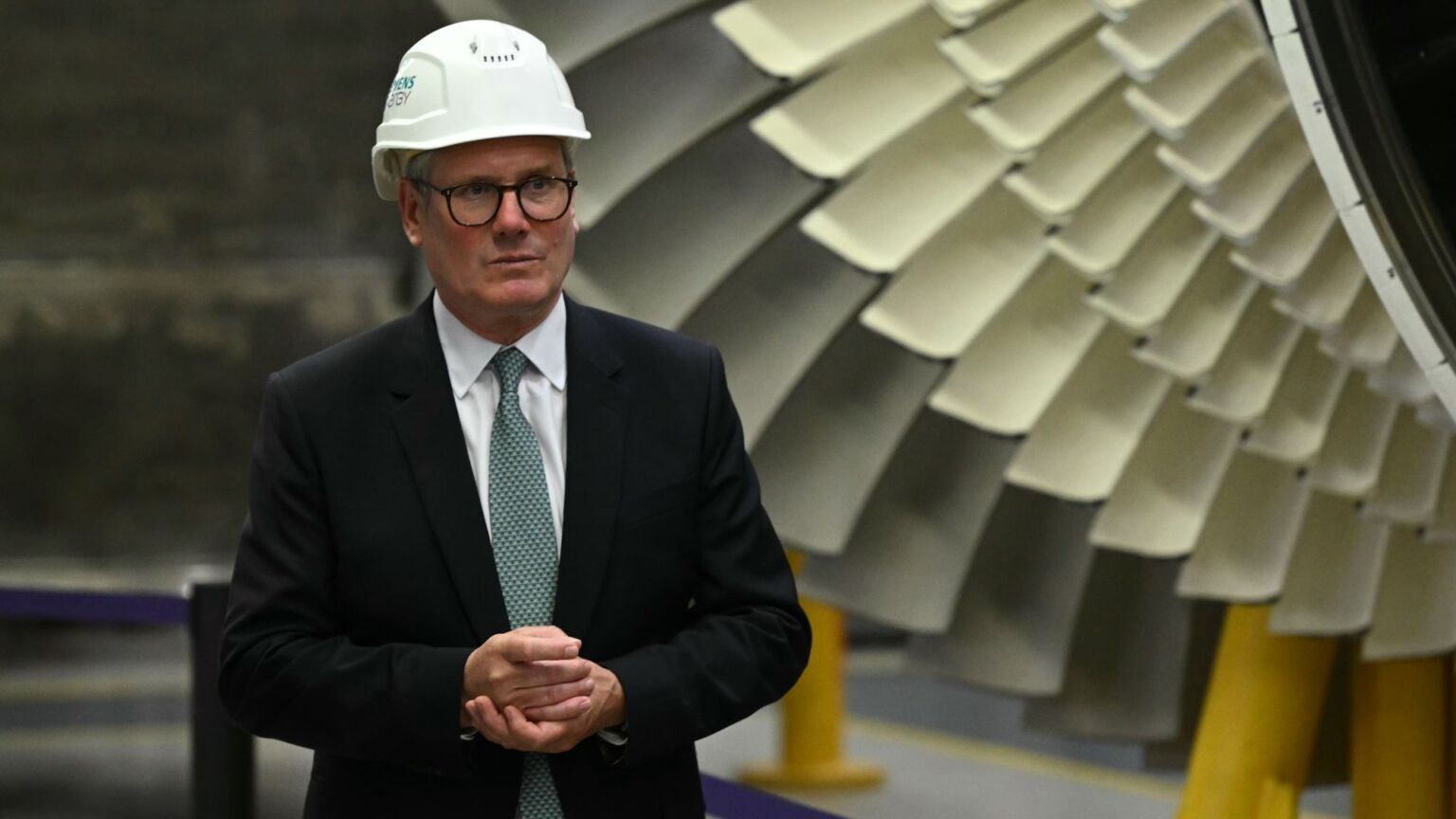Want to reindustrialise Britain? Drop Net Zero
Keir Starmer’s eco-deranged government cannot deliver the industrial renaissance we need.

Want to read spiked ad-free? Become a spiked supporter.
Keir Starmer has promised to ‘fundamentally rebuild British industry’ as part of his government’s efforts to secure peace in Ukraine and to bolster the UK’s own national defences. Re-arming must go hand in hand with reindustrialisation, the UK prime minister argued in the House of Commons yesterday, because ‘economic security is national security’.
The PM is right to say that our national resilience ultimately rests on our economic strength and industrial capacity. But as long as Starmer’s government remains committed to Net Zero, then his words will only ring hollow. The dash to decarbonise the UK economy, in the name of mitigating climate change, has already led to national economic ruin.
The trouble is, Labour’s frontbenchers don’t seem to have noticed. In a speech supposedly dedicated to boosting economic growth, chancellor Rachel Reeves recently hailed Net Zero as ‘the industrial opportunity of the 21st century’. Energy secretary Ed Miliband has claimed to have ‘absolute faith’ that Net Zero will ‘do great things for our country and our world’.
In truth, the results of the failed Net Zero experiment are already clearly visible in shuttered factories and lost jobs. Grangemouth, Scotland’s largest oil refinery, has been forced to close after struggling to cope with soaring energy costs, carbon taxes and Labour’s ban on new North Sea oil and gas licences. Unions representing workers in the oil and gas industry fear they will become the ‘miners of Net Zero’. The car industry is also in deep trouble. Vauxhall shut down its van factory in Luton last year, after 120 years of operation, thanks to the government’s punishing Zero Emissions Vehicle mandate.
Ironically for Starmer, even industries that are critical to defence are being crushed by the demands of his Net Zero agenda. Ahead of the July 2024 UK General Election, Labour vowed to secure the future of the steel industry. Yet just three months later, in government, it oversaw the closure of the two remaining blast furnaces at Port Talbot in Wales, the UK’s largest steelmaking plant. Plans to decarbonise the plant, supported by the government, will not only lead to the loss of at least 2,500 jobs. The new carbon-neutral furnace will also not be able to make the virgin steel that’s vital for warships and other aspects of the defence industry. Of course, what worries Labour most is that prior to their decommissioning, the two blast furnaces made Port Talbot the UK’s biggest single source of carbon-dioxide emissions. To the Net Zero zealot, the loss of a vital, strategic industry like steelmaking can be seen as a necessary sacrifice.
The most damaging aspect of Net Zero has been its catastrophic impact on energy production and prices, which has affected industries across the board. The UK currently has the highest commercial electricity prices in the developed world. As a new research paper by Kallum Pickering and Charles Hall of Peel Hunt lays out, British electricity supply peaked in 2005 and has fallen since thanks to government decarbonisation policies. While the landmark Climate Change Act, which set legally binding carbon targets for the first time, didn’t pass until 2008, and Net Zero didn’t officially arrive until 2019, the New Labour government was already started putting climate at the front and centre of UK energy policy in 2003. And so gas, oil and coal power plants were taken out of commission, only to be replaced with inefficient and unreliable renewables. The result is that, over the past two decades, the electricity available in the UK has fallen by a whopping 21 per cent. This squeezed supply has sent prices soaring, throttled productivity and destroyed industrial competitiveness.
As Hall and Pickering put it, this is an entirely ‘self-inflicted headwind’. Yet it’s a headwind that has only blown stronger since Labour returned to power last year. Ed Miliband has refused new drilling licences for North Sea oil and gas. He has extended the Tories’ ban on fracking, which, if lifted, could supply the UK with decades’ worth of cheap, domestically produced fuel. He has also accelerated the UK’s switchover to a fossil-fuel-free electricity grid. All of which has likely contributed to recent jumps in energy prices and a slump in manufacturing output.
The good news is that a turnaround is possible. If we abandon Net Zero, we can invest in securing abundant supplies of energy that could power the industrial renaissance that Britain so badly needs. But if you think Keir Starmer is going to do this, you’ll be waiting for a very long time.
Fraser Myers is deputy editor at spiked and host of the spiked podcast. Follow him on X: @FraserMyers.
Who funds spiked? You do
We are funded by you. And in this era of cancel culture and advertiser boycotts, we rely on your donations more than ever. Seventy per cent of our revenue comes from our readers’ donations – the vast majority giving just £5 per month. If you make a regular donation – of £5 a month or £50 a year – you can become a and enjoy:
–Ad-free reading
–Exclusive events
–Access to our comments section
It’s the best way to keep spiked going – and growing. Thank you!









Comments
Want to join the conversation?
Only spiked supporters and patrons, who donate regularly to us, can comment on our articles.